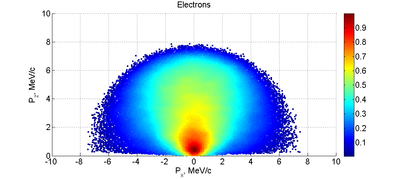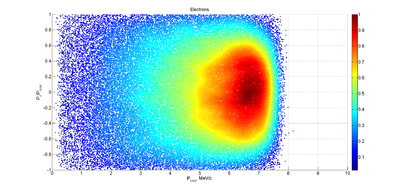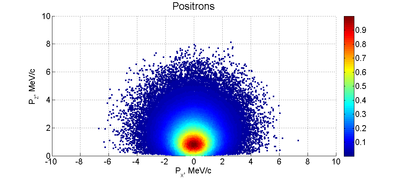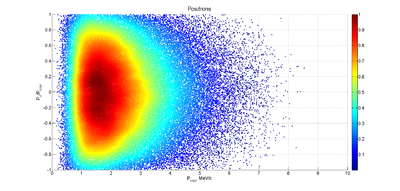Difference between revisions of "Niowave 9-2015"
Jump to navigation
Jump to search
| Line 2: | Line 2: | ||
| − | Simulations were performed to predict the efficiency of producing positrons using a Lead-Bismuth target and a 10 MeV incident electron. MCNPX and GEANT4 were used to predict this efficiency in an effort to benchmark the results. Niowave performed a simulation using MCNPX and ISU used GEANT4. A comparison of the positron production efficiency predictions made by MCNPX and G4beamline (GEANT4) is shown in the table below. The two simulation packages appear to be consistent with each other. | + | Simulations were performed to predict the efficiency of producing positrons using a Lead-Bismuth target and a 10 MeV incident electron. MCNPX and GEANT4 were used to predict this efficiency in an effort to benchmark the results. Niowave performed a simulation using MCNPX and ISU used GEANT4. A comparison of the positron production efficiency predictions made by MCNPX and G4beamline (GEANT4) is shown in the table below. The two simulation packages appear to be consistent with each other for some thicknesses. |
Revision as of 14:32, 13 April 2016
Progress Report, September 2015
Simulations were performed to predict the efficiency of producing positrons using a Lead-Bismuth target and a 10 MeV incident electron. MCNPX and GEANT4 were used to predict this efficiency in an effort to benchmark the results. Niowave performed a simulation using MCNPX and ISU used GEANT4. A comparison of the positron production efficiency predictions made by MCNPX and G4beamline (GEANT4) is shown in the table below. The two simulation packages appear to be consistent with each other for some thicknesses.
| PbBi Thickness (mm) | #positrons/million electrons (G4Beamline) | #positrons/million electrons (MCNPX) |
| 1 | 1138,1154,1097,1159,1125 =113525 | 1091 |
| 1.5 | 1668,1701,1639, 1644, 1628=165629 | 1728 |
| 2 | 1937,1930,1851,1874,1945=190742 | 1984 |
| 3 | 1889,1821,1852,1809,1859=184632 | 1986 |
| 4 | 1726,1696,1673,1693,1681=1694 20 | 1858 |
| 5 | 1566,1543,1546,1625,1566=156933 | 1646 |
| 6 | 1549, 1486,1564,1545,1452=1520 50 | 1541 |
| 7 | 1462,1327, 1407,1489 ,1477=1432 67 | 1541 |
| 8 | 1289, 1335,1280, 1271, 1280 = 1291 25 | |
| 10 | 1141,1241, 1199, 1202, 1148 =118642 | 1216 |
The spatial distributions observed appear below
Electrons and Positrons after 2mm of LBE:
Electrons:
Positrons:



